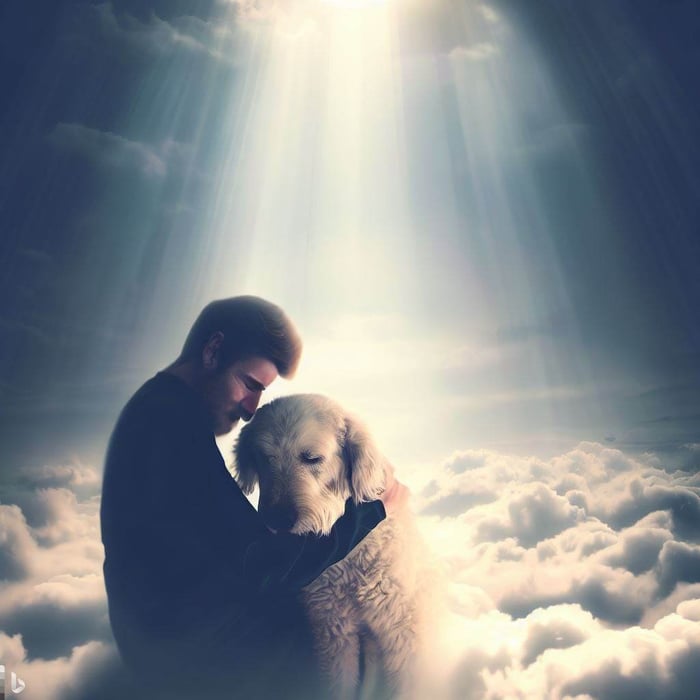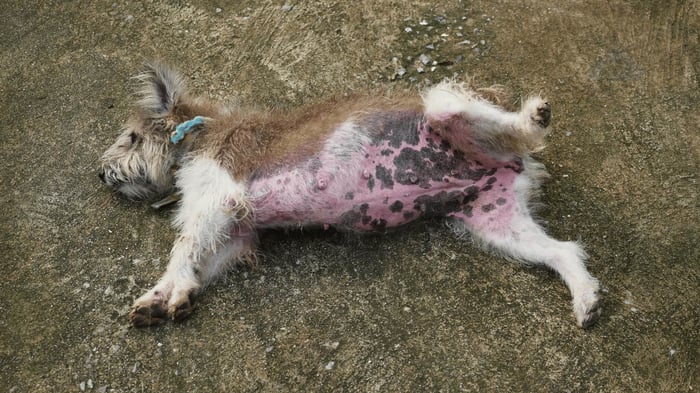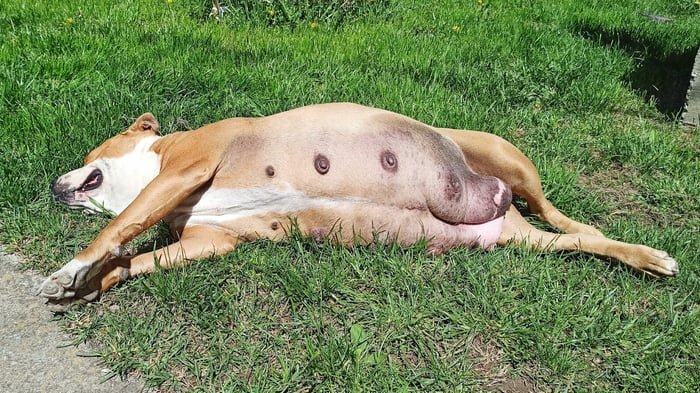The death of a pet can be a devastating experience, leaving you wondering what in the world to do when your dog dies. Dogs are often considered members of the family and provide unconditional love, comfort, and companionship.
Even if you do everything right: Take them to the vet, give them supplements, exercise, and proper nutrition, the inevitable must happen at some point. However, knowing this doesn’t make the loss any less painful.
This means that When a beloved dog passes away, it’s normal to feel a wide range of emotions and go through a grieving process. Coping with the loss of a pet may take time and effort, but there are things you can do to help yourself and others during this difficult time.
So, What Can I Do When My Dog Dies?
Losing a pet is brutally painful to dog owners, and grieving the loss is the only way out of it. Not everyone would understand the true intensity of losing a pet, making surrounding yourself with only supporting people paramount. After acceptance comes the farewell preparations like burial or cremation and memorials for a doggy life well lived.
Grieving the loss of a dog can be just as intense as grieving the loss of a human loved one. As they say, pets make up part of our lives, but you are your dog’s entire life. Therefore, Mourning a pet is like mourning a part of yourself that departed with your canine buddy.
However, some people may not understand the depth of your feelings if they’ve never had a close bond with a pet. This is right around the time you’ll hear the uncalled-for comments like “ he was just a dog.”
Because of this, we’ll stress again that It’s important to find supportive people who understand your grief and can offer comfort and empathy. The least you want at this difficult time is to have your feelings invalidated.
Dogs often know when they’re about to die, but it will always come as a shock to you, even when you are expecting it. We can know that the pup has crossed the rainbow bridge, as we believe dogs have souls, and are not in pain anymore but we can still be distraught. Understanding the grieving process can help you to better cope with the pain.
Understanding the Grieving Process
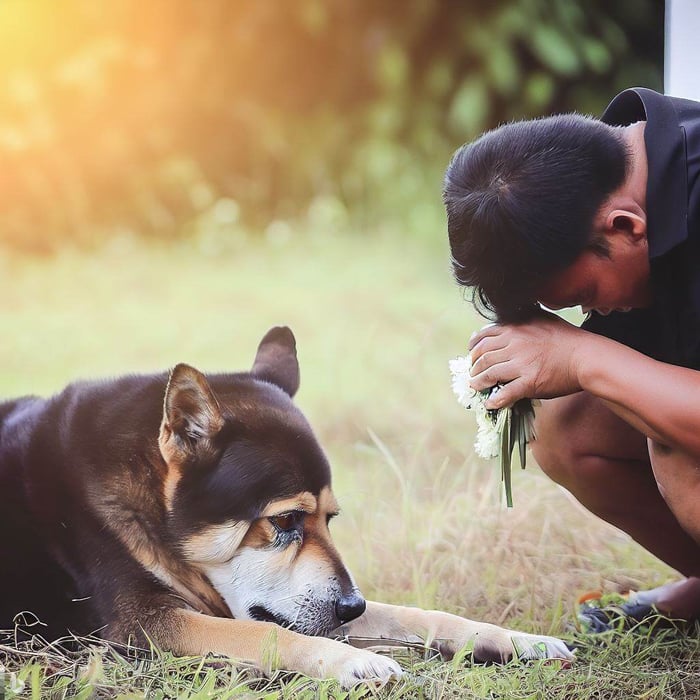
The loss of a dog can be a devastating experience for pet owners. Dogs are more than just pets; they’re beloved family members who provide unconditional love, companionship, and joy. Coping with the loss of a dog can be a challenging and emotional journey, but it’s important to remember that grief is a natural and necessary process.
The Five Stages of Grief
The five stages of grief, as proposed by Elisabeth Kubler-Ross, are a widely recognized model for understanding the grieving process. These stages include denial, anger, bargaining, depression, and acceptance.
It’s important to note that not everyone will experience all five stages, and the order may not be linear. Studies have shown that adopting this 5-stage grieving process has plenty of criticism, making people feel like they’re grieving incorrectly. However, these are the most common grieving stages:
Denial over a deceased dog
Denial is often the first stage of grief, and it’s a common defense mechanism that helps people cope with overwhelming emotions. During this stage, you may find it hard to believe your dog is gone or feel numb and disconnected from your emotions.
You may even wonder why you feel nothing or just numb over your deceased dog. It’s important to note that this is a defense mechanism. Sometimes when feelings seem so big that we don’t know how to deal with them, our brain cuts us off from the feeling entirely. This is just the brain’s way of protecting us from pain and suffering.
Feeling Angry When Your Dog Passed Away
Anger is another common stage of grief, and it can be directed at yourself, others, or even your dog. You may feel angry that your dog died, or you may feel angry at yourself for being unable to save them.
You may also feel angry at your vet for not saving your dog. It’s important to understand that veterinarians suffer a disproportionate amount of mental health issues from their work, including PTSD.
If you feel angry at your vet, try to take a step back before acting or saying anything. You can request an autopsy if you suspect negligence, but don’t direct anger a veterinary professional without a solid reason. Remember, euthanizing or losing animals almost daily is extremely hard on them too and they also suffer for it.
Bargaining, Depression, and Acceptance Over Losing A Dog
Bargaining is a stage of grief where you may try to negotiate with a higher power or find ways to bring your dog back. This is when you’ll feel that “my dog died, and I want him back,” and it is often characterized by guilt and regret.
Depression is a stage of grief where you may feel overwhelmed by sadness and hopelessness. You may withdraw from others and lose interest in activities you once enjoyed.
Acceptance is the final stage of grief, where you come to terms with the loss of your dog and begin to move forward. This stage doesn’t mean you no longer feel sadness or miss your dog, but it does mean you can find joy and meaning in life again.
How Long Does Grieving My Dog Last?
There’s no set timeline for grief, and it can last for weeks, months, or even years. The intensity and duration of grief can depend on factors such as the strength of the bond with the dog, the circumstances of the death, and the individual’s personality and coping skills. Be patient with yourself and others, and remember that healing takes time.
Remembering that there’s no “right” way to grieve is also important. Some people may find solace in talking about their feelings, while others may prefer to grieve privately. Some people may find comfort in creating a memorial for their dog, while others may prefer to honor their dog’s memory differently.
What To Do If Your Dog Dies At Home
After your dog passes away, there are some immediate steps you may need to take, such as making final arrangements, informing family and friends, and memorializing your pet.
However, taking some time to grieve and process your emotions is important. Losing a pet can be incredibly difficult, and it’s okay to take some time to mourn your furry friend.
1. Call for Some Help
It’s advisable to have someone around when you’re grieving your pet’s loss. Being alone at such a difficult time can take a serious toll on your mental health. So severe is the loss that a small study showed that over a quarter of the population could take years to accept the loss of pets.
2. Handle the Dog’s Body
The next step is deciding what to do with the body. You can start by placing a towel under the deceased dog to absorb the bodily fluids released. It’s best not to let the body stay too long as Rigor mortis, the stiffening of the joints, starts as soon as 10 minutes after death. Decomposition follows closely.
If you are burying your dog yourself, be sure to read about how deep to bury a dog’s body properly.
How Much Does Dead Dog Body Disposal Cost?
You can pay $50 to $200 to bury or cremate your dog. However, the charges can increase depending on the place and whether they picked up your dog from home or you brought it yourself. Some pet insurance companies offer a type of funeral plan for dogs that cover cremation services.
3. Making Final Arrangements
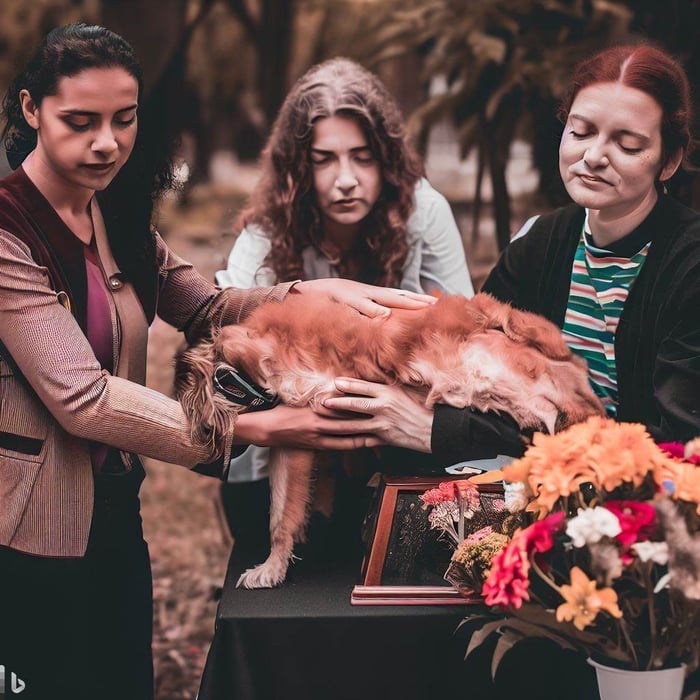
Deciding what to do with your dog’s body can be difficult. You may choose to bury the dog in a pet cemetery or your backyard or have the dog cremated. Some people may keep the dog’s ashes in an urn or scatter them in a special location. Whatever you decide, make sure it’s legal and per your beliefs and values.
If you choose to bury your dog, make sure to check with your local regulations and zoning laws. Some areas may have restrictions on backyard burials or require a permit for pet cemeteries.
If you opt for cremation, you can choose to have a private cremation, where your dog is cremated alone, or a communal cremation, where multiple pets are cremated together. You can also have your dog’s ashes returned to you in a decorative urn or scatter them in a special location.
4. Informing Family and Friends
It’s important to inform immediate family and close friends about the death of your beloved pet, especially if they knew the dog well. Share your feelings and memories, and ask for their support if you need it.
Consider contacting a pet loss support group or a therapist specializing in pet loss. It’s normal to feel a range of emotions after losing a pet, including sadness, guilt, and even anger. Talking to someone who understands what you’re going through can be incredibly helpful.
5. Memorializing Your Pet
Creating a memorial for your dog can be a meaningful way to honor their life and keep their memory alive. You might create a photo album or scrapbook, display their collar or dog tag as keepsake, plant a tree, or donate to a pet-related charity in their name.
There are many beliefs about where a dog goes after they die. Ultimately, where your pet is after passing depends on you and your beliefs. If you know your dog is happily waiting for you on the other side, that will be the reality.
What To Do If Your Dog Dies At Night?
Losing your pet at night is dreadful since getting the normal services and support you would during the day is harder. After verifying the death, you can place a towel under them to catch the bodily fluids.
Thereafter, you can decide whether you’ll wait till morning or call a body moving agency that operates 24 7. It’s best to call for someone for emotional support if possible.
How to Cope With Dealing With The Loss of a Pet?
Seeking Support from Others
Engaging in Self-Care
Finding Comfort in Memories
How Can I Help My Children Cope with the Loss of a Pet?
Children may have a particularly difficult time coping with the loss of a pet, especially if it’s their first experience with death. Here are some tips for helping kids deal with their grief.
Explaining Death to Children
Be honest with children about what happened to the dog, using age-appropriate language. Explain that death is a natural part of life and that feeling sad or emotional is okay.
Encouraging Emotional Expression
Help children express their feelings about the dog through talking, drawing, or other creative activities. Encourage them to share their memories and thoughts.
Involving Children in Memorial Activities
Involving children in creating a memorial for the dog can help them feel a sense of closure and honor the dog’s life. Consider planting a tree, making a photo album, or having a special ceremony or ritual.
Frequently Asked Questions (FAQs)
Where Do Dogs Go When They Die?
Should I Let My Other Dog See My Dog That Has Passed On?
Will My Dog Visit Me After He Dies?
Final Thoughts
Losing a beloved dog can be a difficult and emotional experience, but it’s important to remember that you’re not alone. Allow yourself time to grieve, and seek support from others if you need it.
Coping strategies such as self-care, finding comfort in memories, and creating a memorial can help you through the process. With time and care, you can heal from losing your dog and cherish the memories you shared.


